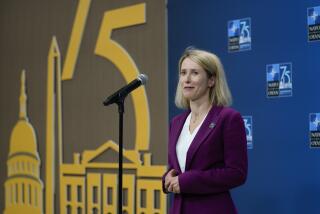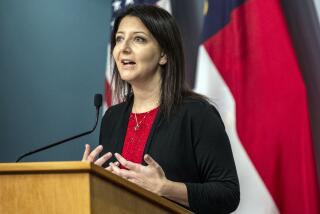Ex-Premier of Norway to Lead World Health Agency
- Share via
UNITED NATIONS — Former Norwegian Prime Minister Gro Harlem Brundtland was elected Tuesday to head the World Health Organization and promised to reform the troubled agency.
WHO, a U.N. affiliate headquartered in Geneva, provides health care training and guidance around the world, organizes childhood immunization programs, provides international drug and food safety guidelines, tracks and battles epidemics, and promotes anti-smoking campaigns and good health practices.
Although the agency is credited with eradicating smallpox, alerting the globe to the international spread of AIDS and wiping out polio in the Western Hemisphere, in recent years it has declined in reputation. Much of the blame has fallen on Hiroshi Nakajima of Japan, the outgoing director general. He was viewed as an ineffective administrator who failed to articulate a compelling vision.
WHO member nations that supported Brundtland as Nakajima’s successor, including the United States, argued that her background as a physician, international environmental activist and leader of the Norwegian government for 10 years would help her galvanize the agency to fight new diseases such as the Ebola virus and “bird flu” and the reemergence of others, such as tuberculosis and malaria.
Brundtland, 58, was elected by the agency’s 32-member executive board in Geneva. Her election to a five-year term is to be confirmed in May by the World Health Assembly, the representative body of the organization’s 191 member nations. She will take office July 27.
WHO has 3,700 employees and an annual budget of $421.3 million, plus $350 million in voluntary donations by member states. The U.S. is its biggest contributor, paying 25% of the budget, although the Clinton administration is seeking to get that figure lowered to 20%.
“The first thing I’m going to do is to start with internal reform,” Brundtland told reporters after her election. She said there is a need to “renew the management style at the WHO,” which has been accused of devoting too many resources to central administration and not enough to its field activities.
Brundtland received her medical degree from the University of Oslo and a master’s in public health from Harvard. A member of the Norwegian Labor Party, she served in public health posts before being named environment minister in 1974. Seven years later, at age 41, Brundtland became her country’s first woman prime minister.
In 1987, she chaired the U.N.’s World Commission on Environment and Development, producing a report that led to the Earth Summit held in 1992 in Rio de Janeiro.
She is the third woman named in recent months to a top post at the U.N., an organization dominated by men in its highest ranks. Mary Robinson, the former president of Ireland, became U.N. high commissioner for human rights in September, and Louise Frechette, then Canada’s deputy defense minister, was selected deputy U.N. secretary-general this month.
More to Read
Sign up for Essential California
The most important California stories and recommendations in your inbox every morning.
You may occasionally receive promotional content from the Los Angeles Times.













